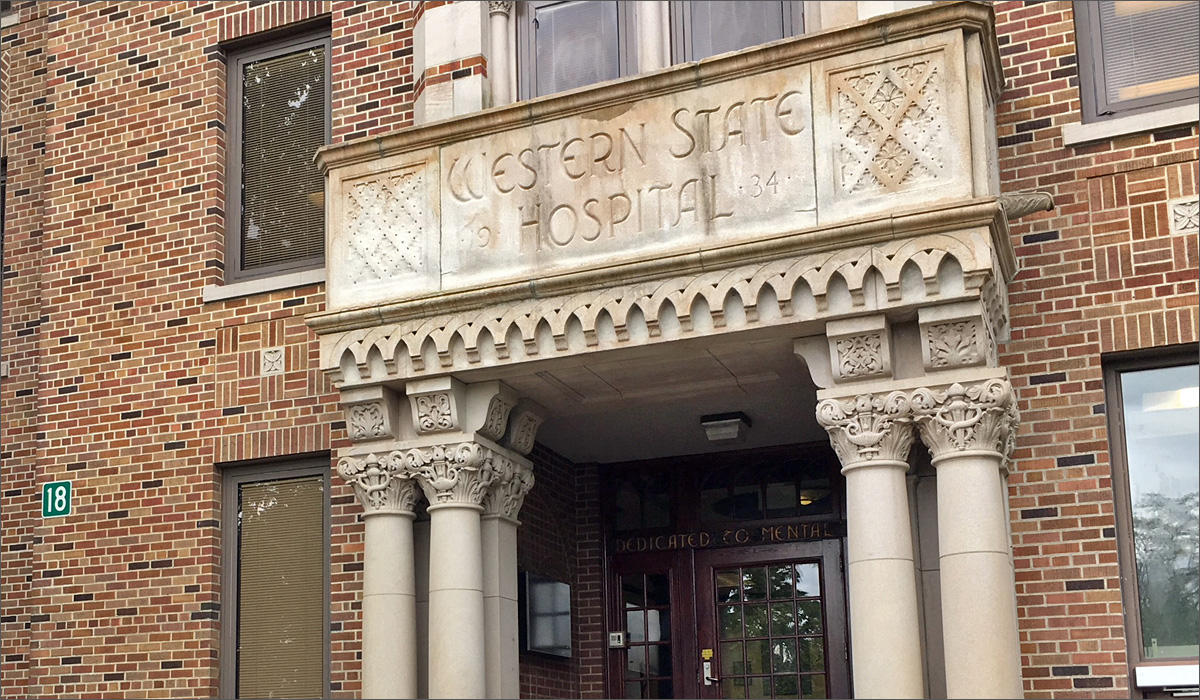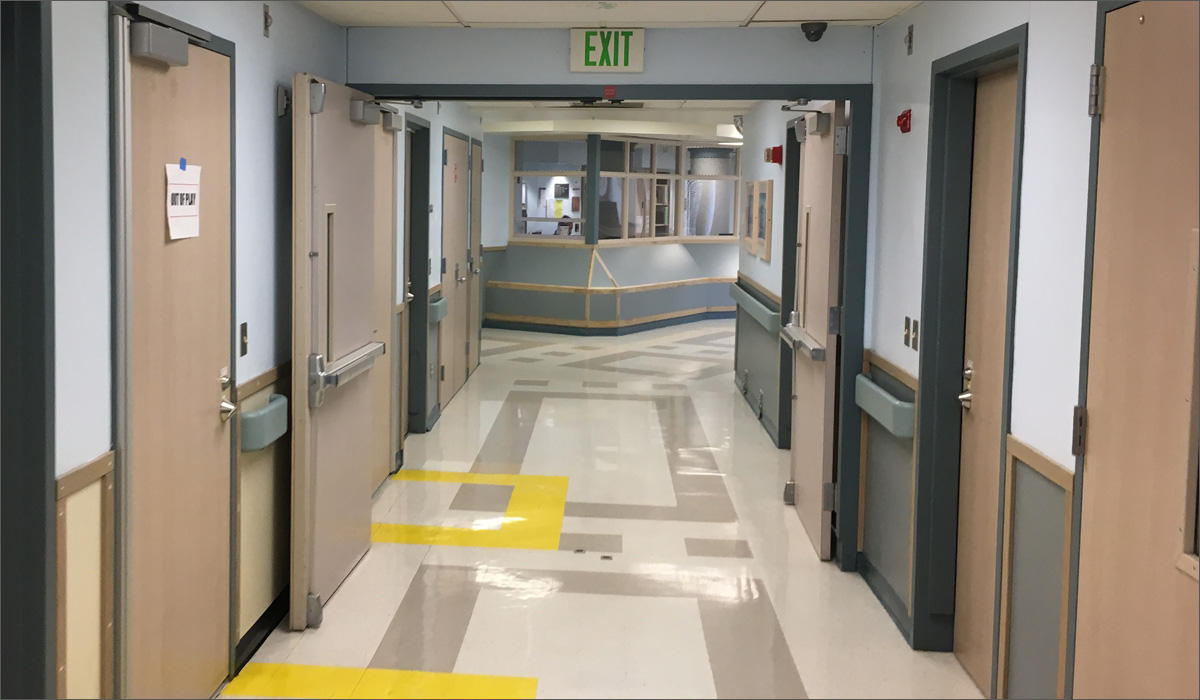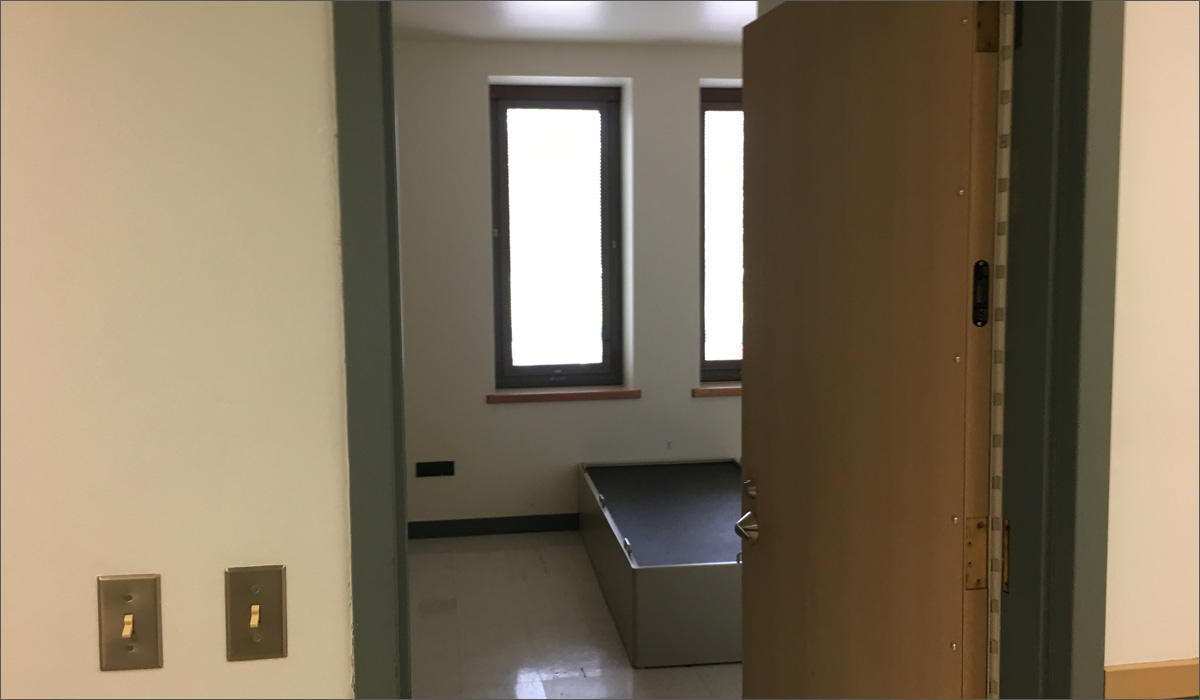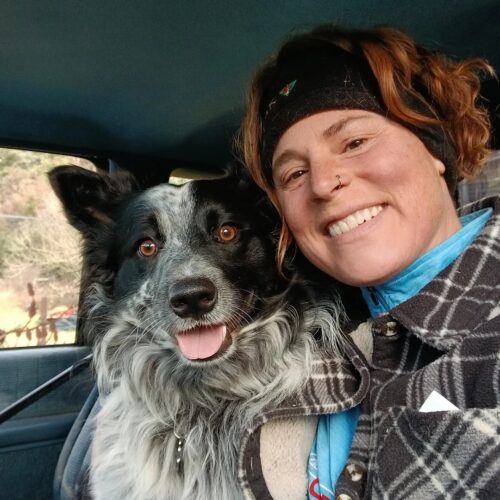
At Western State Hospital, A Waitlist To Get In And A Waitlist To Get Out
Listen
One night about a year ago, the lights in Brian’s Tacoma apartment suddenly went out. He was in his bedroom. When he walked out to see what had happened, he said he found his adult daughter who lived with him had stuck a bread knife into an electrical outlet.
She wasn’t hurt, but it was a scary moment. Brian said his daughter, who has struggled with mental illness since college, was off her medications, hadn’t left their apartment in months and was agitated because of an upcoming move.
» Have a loved one at Western State Hospital? We’d like to hear from you.
The next day, Brian called the county mental health crisis number. Soon his daughter, who was 29 at the time, was involuntarily committed to a community-based psychiatric facility and put on the waitlist for Western State Hospital.
While she waited, Brian said his daughter bounced between in-patient mental health treatment facilities in Pierce County.
“She was just kind of surviving,” Brian said in an interview with public radio, The News Tribune and The Olympian. He asked that his last name not be published and that his daughter not be named, saying he feared employers and others might discriminate against her in the future.

Western State is one of the largest psychiatric hospitals west of the Mississippi River. CREDIT: AUSTIN JENKINS
In the end, Brian said his daughter waited nine months for a bed at Western State Hospital. Officials at Western State Hospital would not independently confirm that timeline citing privacy concerns. But they did discuss in detail a bottleneck that has plagued the state hospital for more than a decade.
On any given day, nearly half the civil, or non-criminal, patients at Western State are ready to be discharged, but there’s nowhere to send them. That means they take up beds that patients in crisis, like Brian’s daughter, may desperately need.
In other words, there’s a waitlist to get into Western State because there’s a waitlist to get out.
DIAGNOSING THE BACKLOG
With more than 850 beds, Western State is one of the largest psychiatric hospitals west of the Mississippi River. More than 500 of those beds are reserved for patients like Brian’s daughter who are civilly committed because a judge determines they pose a risk to themselves or others. The remaining 270 beds are for forensic patients who come through the criminal justice system.
But even with all those civil beds, as of this month 106 civil patients were awaiting admission to the hospital, according to the Department of Social and Health Services. The average wait time is 62 days for younger adults and 48 days for older adults.
By contrast, as of May 1, Oregon State Hospital had 18 people on its civil commitment waitlist and an average wait of 20 days, according to a spokeswoman.

Western State Hospital has 18 civil wards for patients who have been involuntarily committed because they pose a threat to themselves or others. This ward is not in use and has been converted to office space. CREDIT: AUSTIN JENKINS
For patients already at Western State, the waitlist to get out is even longer. As of this month, 230 patients were on the “ready to discharge” list. The median wait time for a placement in the community was 104 days, according to DSHS. Some patients wait years or even decades to get out.
“It certainly is one of our greatest challenges,” said Marylouise Jones, the interim CEO of Western State Hospital who noted there wouldn’t be a waitlist to get into the hospital if there weren’t so many patients waiting to discharge.
So what’s the hold up? Only about a quarter of the patients on the discharge list are able to live independently or with their families. The rest require an adult family home, a skilled nursing facility or some other higher level of care to help them manage their psychiatric and medical needs. But Jones said often those places don’t want to take a Western State patient—especially if that person has a history of disruptive or violent behavior or a past criminal record.
“When places are able to say ‘no, this person is too high a risk’…that’s where we have the bottleneck,” Jones said.
STIGMA OF A STATE HOSPITAL STAY
This is not a new problem. In 2008, The Seattle Times reported that at the time, nearly 20 percent of the hospital’s patients were ready to discharge. That led to a lawsuit on behalf of one patient whose condition doctors said was deteriorating the longer she stayed in the hospital.
Some of the patients on Western State’s discharge list have been at the hospital for decades. The hospital also has 26 patients with dementia who could leave the hospital if the right community placement existed. Long-term patients and patients with dementia are among the hardest to place.
“We’re really trying to hand pick, match make if you will, placements that will be a good fit, that will create a true home where that individual can live in the community successfully,” said Melissa Capobianco, the director of social work at the hospital.
There have been some successes. Capobianco gives the example of one longtime patient who spoke English as a second language and needed a higher level of care. After interviewing a dozen adult family home operators, they finally found one who spoke his native language and whose home was in a bucolic setting that reminded the patient of where he had grown up.
“And this individual was able to discharge from here having lived here for decades and to go into this home successfully and is still successfully there to this day,” Capobianco said.
But finding that match is often the exception, not the rule.
Unlike most other states, Washington doesn’t have step-down facilities that are required to take state hospital patients. Instead, the hospital works with DSHS’s Home and Community Services division to locate adult family homes or other facilities that voluntarily will agree to take a former patient.
“There is definitely a stigma with mental health conditions and there’s a stigma particularly for people with mental health conditions that have landed them in state hospitals, multiple times sometimes,” said Bea Rector, the director of Home and Community Services.
In addition, Rector said some care providers feel they don’t have the training or skills to take someone who has a psychiatric diagnosis or history.
“It’s not a lack of beds, it’s a lack of the right beds at the right time and in a preferred location,” Rector said.

The average cost of a bed at Western State Hospital is $790 a day. By contrast a bed in an adult family home costs $95 per day, according to the governor’s office. CREDIT: AUSTIN JENKINS
John Ficker, executive director of the Adult Family Home Council, said his providers would like to see a bigger boost in state money to pay for costly hard-to-serve patients and more support from the government in managing the patients to take some pressure off the homes.
The state of Washington is in the process of trying to build more capacity in the community. This includes providing additional training to providers and opening Enhanced Services Facilities to serve patients discharging from the state hospitals. These eight- to 16-bed residences have staff who are trained to provide behavioral health as well as personal care and nursing services.
Washington currently has three ESFs, one in Vancouver and two in Spokane. A fourth one is set to open in Everett in September.
In the meantime though, the hardest-to-place patients will remain hospitalized.
”We know that they are healthy and safe in the state hospital,” Rector said. “And so until we find that right placement, we are making that difficult decision to have them in the hospital while we continue to build the community resource that will meet their need.”
The status quo isn’t cheap. According to the governor’s office, the average bed rate at Western State Hospital is $790 a day. By contrast, Enhanced Service Facilities cost $425 per day and Adult Family Homes just $95.
NO QUICK FIXES
Last month, Brian said he was notified his daughter was stable enough to leave Western State Hospital. But he was cautioned it could take awhile to find a suitable place for her to live.
“They don’t have the places, the physical places and the staff, to treat as many people as there are that need help,” said Brian, who has decided he can’t safely care for his daughter at home because she is, in his words, “treatment-resistant.”
Brian said it’s his understanding his daughter was interviewed for placement in one facility, but it wasn’t the right fit.
The discharge efforts faced a further setback this week. Brian said his daughter has refused to take medication and sign paperwork that would ensure she has Social Security and medical benefits in the community.
In the coming years, pressure will only increase on Western State Hospital to transition civil commitment patients back to the community.
Last week, Gov. Jay Inslee set a 2023 deadline to stop sending civil mental health patients to Western State Hospital as well as Eastern State Hospital near Spokane. Instead, the governor proposed to build a dozen new 16-bed mini-hospitals across the state to treat civil commitment patients. Western and Eastern State Hospitals would instead be reserved for forensic patients, many of whom are languishing in jails awaiting services to evaluate or restore their competency to stand trial.
Since July 2016, the state has accrued more than $56,000 in contempt of court fines for failing to meet court-ordered requirements for the treatment of criminal defendants in need of mental health competency evaluations and restoration services.
For parents like Brian, with a child in the civil side of the hospital, a renewed investment in the community mental health system can’t happen fast enough.
“Her whole life for the past eight years has been kind of on the verge of homeless[ness] and not doing the things that she’s capable of doing and that’s just the really sad part.”
Sitting at his kitchen table recently, he fought back tears as he described his daughter’s struggles with mental illness.
“You thought the future was going to be so good and then it’s not so good,” he said.
As a child, Brian said his daughter tested as gifted and showed a talent for music and art. She attended a top college, double majored in science and art and studied abroad. But her junior year she had what he calls a mental “break.” Over the last eight years she’s been in and out of psychiatric hospitals.
“Her whole life for the past eight years has been kind of on the verge of homeless[ness] and not doing the things that she’s capable of doing and that’s just the really sad part,” Brian said.
Now he just wants his daughter to find a place to live in the community where she can be safe and find stability.
This story was reported in collaboration with Walker Orenstein of The News Tribune and The Olympian.
Copyright 2018 Northwest News Network
Related Stories:

Voucher program provides free counseling for farmers
Washington State University offers a Farm Stress Counseling Voucher program for farmers. Roni Ryan, pictured, is one of the farmers who has received counseling from the program. (Courtesy: Roni Ryan)

Bills to allow some, regulated access to psilocybin unlikely to move forward
Washington state lawmakers still can’t pass bills to allow for some legal access to psychedelics.
With Feb. 21 as the cutoff for bills to move out of policy committees, two pieces of legislation that would have allowed regulated and supervised access to psilocybin for adults won’t be moving forward — Senate Bill 5201 and House Bill 1433. The bills faced opposition from state psychiatric and medical groups, as well as advocates for psychedelics.

‘It’s a crisis’: How the shortage of counselors is affecting the rural Northwest
In small towns, such as Walla Walla, Washington, behavioral health care providers can be hard to come by. (Credit: Susan Shain / NWPB) watch Listen (Runtime 3:49) Read By Rachel
















